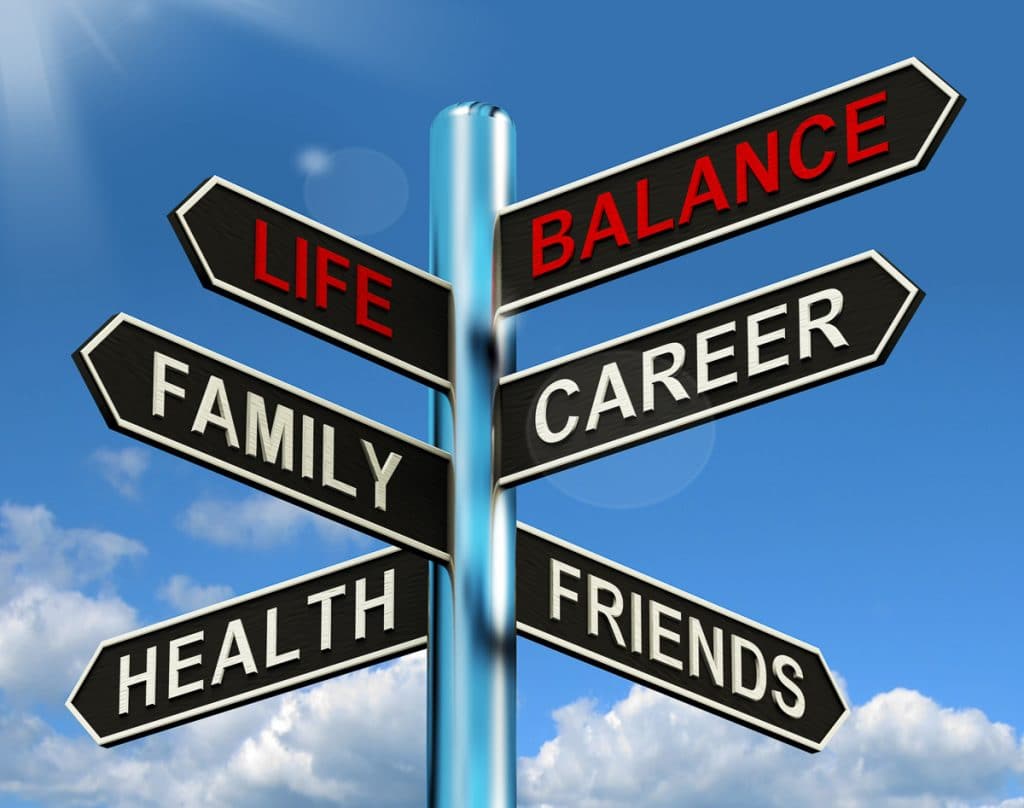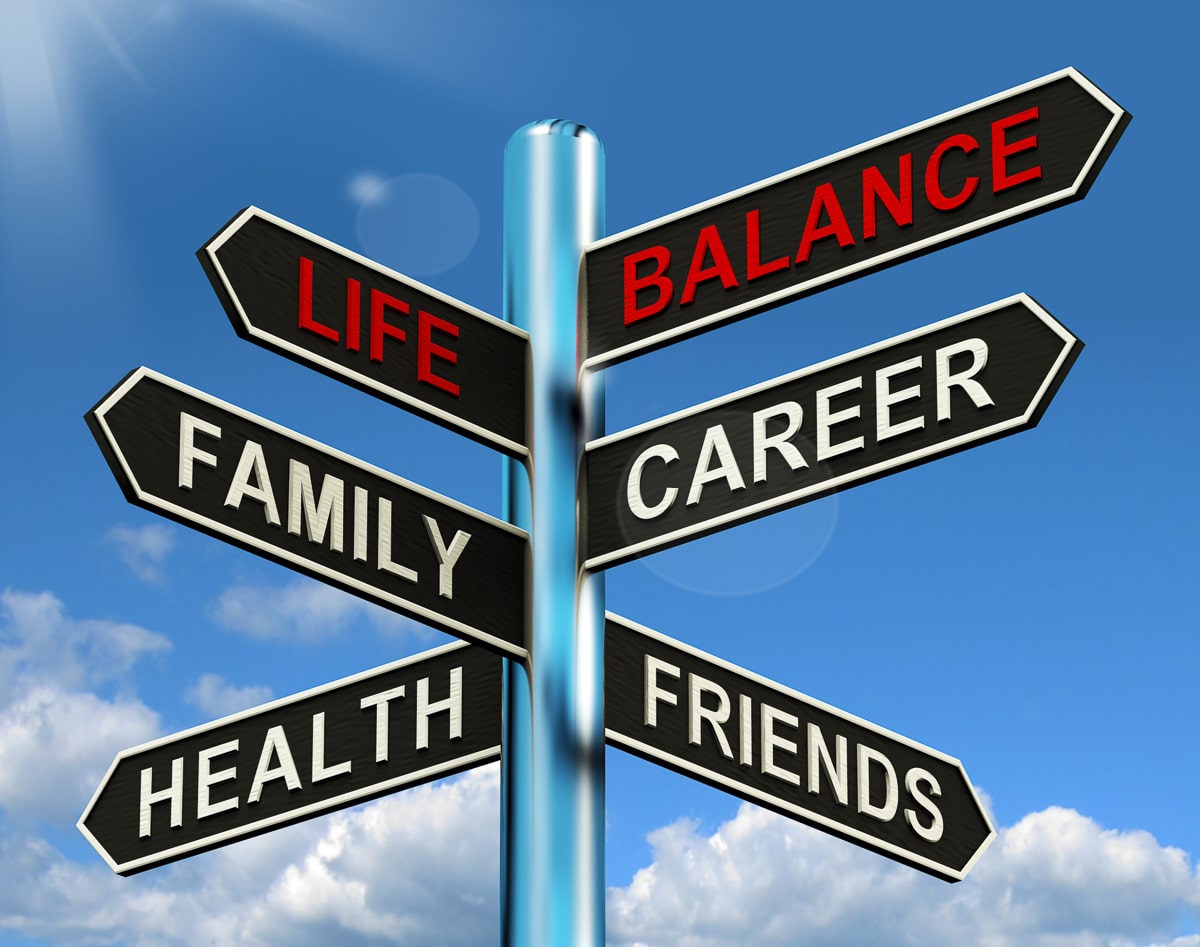
I’ve heard people say that work-life balance is a myth. I was in a networking meeting and one of the business owners said, “There’s no such thing as work-life balance!!”
A lot of people have the same belief. They think you have to work all the time to be successful and make a lot of money. I agree that if you work hard, you can become successful. But you don’t have to work crazy hours to earn a great income and have the lifestyle you’ve dreamed of.
You don’t have to work crazy hours to earn a great income and have the lifestyle you’ve dreamed of.
There are extremely successful coaches who are earning over a million dollars a year while working three days a week. How is this possible being in one of the most saturated markets in the world? Do these people have some sort of magic formula that the rest of us don’t know about?
No. They’ve learned to prioritize their time on their highest income producing activities and they also make time to enjoy their lives.
I’ll show you how you can find work-life balance and not have to give up your income or your time. In fact, you’ll actually earn more and get more time back to enjoy life. Sound too good to be true? Read on and find out!
Schedule Your Personal Time First
One mistake I see my clients making when trying to grow their business is not making any time for themselves. They think they need to spend every waking minute thinking about and working on their business. Like taking care of a baby they constantly have to check on to see if it’s still breathing, even when it’s sleeping.
You do need to pay attention to your business, but not at the expense of your own self-care.
What happens when we don’t take time for ourselves? When we stop exercising, eating healthily, or making time to spend with our loved ones where we’re fully present?
We turn into the one track mind business owner who ONLY thinks about their business. Our energy is lower because we’re not eating well or getting enough sleep. We feel more stressed because we’re working so many hours and not getting a mental break. And we feel guilty for not being engaged and emotionally present with the people we care about the most. We don’t show up as the BEST version of ourselves.
Sometimes we think the more time we spend on our business, the better it should perform. That’s not actually true. You need to prioritize the most important activities first, and it starts with taking care of yourself. When you do this, your performance improves because you feel better, you have more energy and you’re happier. Self-care also lowers stress and helps you handle future stressful events more effectively.
The first step to finding work life balance is to schedule your personal time first.
This includes scheduling your self-care time, exercise, time to spend with your partner or family members and friends.
When I was a dentist, I never exercised because I was too exhausted at the end of every day. I tried to be a weekend warrior but I never did it consistently. Plus I was numbing my stress of work with eating unhealthily, and I gained 20 pounds over 13 years. Which became a vicious cycle because I wasn’t happy with how I looked and felt, so I ate even more.
Now I spend an hour every morning where I do activities that inspire me and make me feel ready to take on anything. I do meditation, visualization, reading and journaling followed by 30 minutes of exercise. My favorite forms of exercise are jogging or doing a workout DVD. I also listen to inspiring podcasts and audiobooks when I run to get me even more motivated.
This hour has made such a difference in how I feel and perform every day. I didn’t notice a big difference at first, but on days that I missed my routine, I could tell that my temper was shorter and I didn’t feel as grounded. When I do my routine, I have more energy and I feel like I can handle almost anything. I also have a lot more patience for my kids too. My business success in the past few years has increased tremendously, and I attribute a large part of it to my morning self-care routine.
I also make sure to schedule alone time with my husband and my kids. My daughter and I go on regular walks or we do puzzles together after dinner. I schedule date nights every month for my husband and I where we get to reconnect as a couple.
By scheduling in your personal time first, you’ll make sure that the most important things in your life won’t get put off. As business owners it’s easy to occupy all of our time working on our business. But we need to remember why we became business owners in the first place. It probably wasn’t so we could ignore everything else in our lives. It was to give ourselves a feeling of purpose and to have a career we could be proud of. But we don’t have to sacrifice our personal time to reach our goals. By intentionally making space for our personal time, we’ll feel more balanced and we’ll show up as the best version of ourselves for our family, friends and our clients.
Have a Start and End Time To Your Day
If you work from home, you can start work whenever you want. This has its benefits and drawbacks. I love being able to choose my own hours, but it takes a lot of discipline not to work all the time when it’s always at your fingertips.
It’s so easy to just jump on the computer or check your phone for emails first thing when you wake up. But if you don’t create boundaries around your work and personal time, they’ll start to blend together and you may feel out of balance.
My husband used to be the worst offender of this. He wakes up at 5am every day and sometimes I’d catch him working at 5:30am. I’d say, “What are you doing?? You don’t need to be working this early!” And he’d say, “I’m just shooting off a quick email- it only takes five minutes.”
Why is this a problem?
Because you’re working more hours than you need to, and it’s actually making you less productive than you think. When you don’t have set work times, you’re actually working less efficiently.
According to Parkinson’s Law, work expands to fill the time assigned to it. So if you’re now working 12 hours a day instead of 9, you’re not producing more. You’re just taking longer to complete what used to take you three hours less.
Recent studies have shown that people who work from home are now spending more hours than before, even though they’re not commuting anymore. In a recent Bloomberg article it states, “In the U.S., homebound employees are logging three hours more per day on the job than before city and state-wide lockdowns.”
Add that to the fact that many people who used to work out at the gym before work aren’t doing that anymore either.
The lines between our personal lives and work are becoming blurred. And it’s not healthy.
One of the ways to prevent this is to have a start and end time to your workday. Mine starts at 9am and ends at 4pm. I make sure to dress for work, even if I’m just on the phone. It sets my mindframe for being at work. When my day is done, I change out of my work clothes, kind of like how Mr. Rogers changed his shoes at the end of his day. It signals to me that I can now switch out of work into personal mode.
Having set working hours will help you feel more balanced and help you be more efficient at work.
Use Your Greatest Strengths 80% of the Time
How much time do you spend doing things you don’t enjoy at work? When I was a dentist, I used to do all my own bookkeeping even though I hated doing it. I knew how to use Quickbooks and I was the best at figuring out the payroll in my office, so I thought I should. Every time payroll came around, it would put me in the worst mood. My whole family would steer clear of me during that time because I wasn’t pleasant to be around.
If I’d known then that bookkeeping is not one of my strengths, I would have just hired a bookkeeper and been so much happier! And I could have spent that time doing what I enjoyed and was best at instead, like new meeting patients, which probably would have made me more money too.
Just because you’re good at something doesn’t mean it’s good for you.
Now that I understand my personality type from the CVI personality assessment, I know that those type of detail oriented tasks are not my forte and it’s a much better use of my time and money to hire someone to do them instead.
Once you understand your greatest strengths, you should focus the majority of your time using them. These are the tasks you’re naturally good at, you enjoy doing and it’s how you provide the most value to the world.
They’re also tied to your biggest moneymaker, which is the one thing you need to do consistently to grow your business.
When you start focusing on your greatest strengths and using your biggest moneymaker, you’ll become much more efficient with your time and you’ll stop doing the less important things. Which will lead you to having more time and work-life balance.
Check the ROI (Return On Investment) of Your Current Activities
When’s the last time you took stock of all the current activities you’re doing?
I’m a Merchant/Innovator which means I love helping people and sometimes have a hard time saying no. Whenever someone would ask me for help, I’d say yes without even thinking about what I was getting myself into. Then I’d end up being committed for months doing something that I wasn’t really passionate about.
Since then I’ve learned to be very selective about my activities. We only get a certain amount of hours every day so we need to choose how we use them wisely. I need to carefully evaluate the ROI before agreeing to do it. I’ve learned to say no so I can say yes to the highest priorities in my life and business.
When you say no to something, you’re saying yes to a higher priority.
Michael Hyatt
When my clients say they have no time for themselves, I have them go through all their current commitments. They rank the ROI of each on a scale of 1-10 from four different areas: financial, educational, relational and spiritual. If any of them are less than an 8, I have them evaluate if they should continue doing it.
I had a client who was working nights and weekends and was feeling overworked and exhausted. I asked her how she was spending her time. She was a member of six networking groups. When she evaluated the ROI of each, she realized that two of them weren’t serving her. She decided to drop them, and ended up getting back 20 hours a week! Also she saved a significant amount of money on the membership fees, parking and gas for the monthly meetings. She ended up investing the money she saved back into marketing for her business. And she now has time for her self-care and activities she enjoys doing: exercise, reading, and gardening. And the best part is she’s taking longer and more frequent vacations with her husband as well.
Take a hard look at all your current activities and see which ones are really serving you. If they aren’t, maybe it’s time to consider letting them go.
Create Your Ideal Schedule
Once you’ve determined your biggest moneymaker and assessed all your activities, you can create your ideal schedule. Here’s my method that has led to my business growing exponentially while also have real work-life balance.
Set aside an hour and do a brain dump of all the things you need to do. I write down everything I can think of on a piece of paper. Seeing it all on paper creates space in your brain that can improve your creativity and lower your stress.
Next, I prioritize each activity on a scale of 1-4.
1- Urgent, do it now
2- Important, do it soon
3- Necessary- delegate it or do it later
4- Dump it
Then I assign how long each task will take. Ex. 1 hour, 15 minutes etc.
Last, I schedule every single task in my calendar.
Here’s how I schedule my calendar.
- Personal time first: my daily morning success routine, dates with my husband or kids, and get togethers with friends.
- Time for my biggest moneymaker every week, twice a week for 2-3 hours.
- All my client calls, consultations and networking calls for the month.
- Everything from my to do list with only three rocks per day.
Rocks are the most important things you need to do to move your business forward. By only choosing three, you will get more traction in your business and create more revenue.
To determine your rocks, ask yourself, “What’s most important right now to move my business forward?”
Often times we spend too much time on easier, less important tasks instead of our biggest moneymaker. Or we put off the things we know we need to do because it requires more brain power.
A tip is to do the hardest rock first. Once it’s done, everything is easier!
Conclusion
Work-life balance doesn’t have to be a myth. We all get the same amount of hours in our day. We need to choose how we want to use them.
By prioritizing the most important things in our personal lives first, we’ll ensure that we aren’t forgetting them. By taking care of ourselves, we’ll be happier, more productive and will do better work.
Having set start and end times will create boundaries so you can be efficient and not work more than necessary.
Focusing on your moneymaker will ensure that you’re doing the most important activities for your business.
Keeping activities with the highest ROI will get you hours back that you can spend doing things you enjoy.
And creating your ideal schedule will allow you to have a successful business and time to enjoy your life. Isn’t that why you became an entrepreneur?






